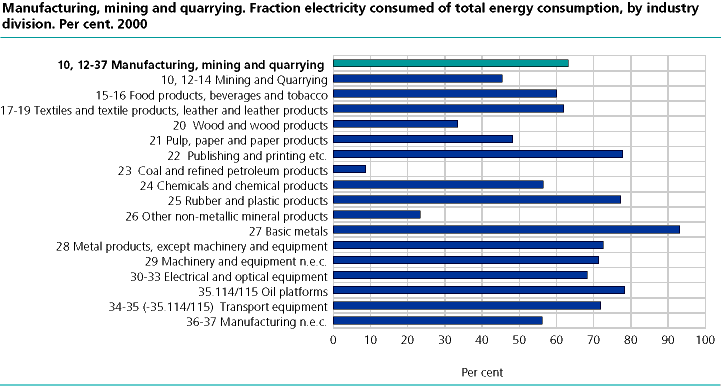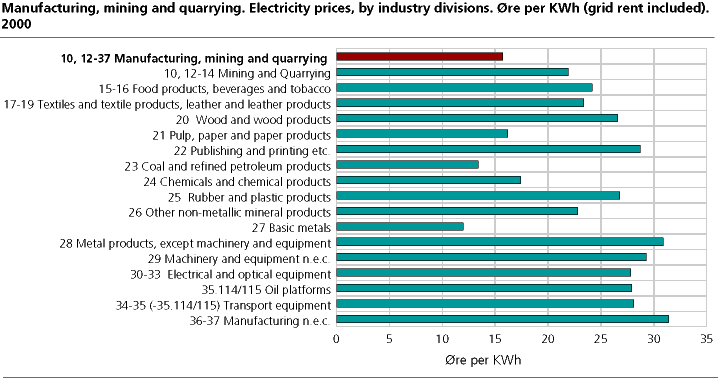Content
Published:
This is an archived release.
Minimal change in the use of energy
In 2000 total energy use in manufacturing, mining and quarrying was 80 289 GWh, a rise of 0.3 per cent from the previous year. Total energy costs increased by 5.6 per cent to 10 825 million.
Use of purchased energy rose by 0.8 per cent to 66 798 GWh in 2000, while use of self-produced energy fell by 2.4 per cent to 13 490 GWh. In total the use in manufacturing, mining and quarrying then rose by 0.3 per cent. The preliminary national accounts show an unchanged production in manufacturing, mining and quarrying in 2000.
The energy-intensive sector, which covers manufacture of primary aluminium, ferroalloys, basic chemicals and the paperindustry, accounted for 66.2 per cent of the total energy use in manufacturing, mining and quarrying in 2000. Energy use in these industries increased by 3 604 GWh or 7.3 per cent compared with the previous year. This can be explained by higher production in the chemical industry in 2000. The oil refineries accounted for 7.9 per cent of last years energy use, a decrease compared with 1999. In the food products industry, energy use fell by 12.4 per cent, thus accounting for 5.9 per cent of total energy use in manufacturing, mining and quarrying.
Sharp increase in oil and gas prices
The rise in the energy costs can be explained by rise in the oil and gas prices in 2000. The average oil price increased from 141 NOK in 1999 to 250 NOK in 2000 and the price of heating oils increased by more than 40 per cent in 2000. The increase was largest for light heating oils, where the price rose by 44.5 per cent. The gas price rose by 37 per cent in the same period.
Average price on electricity decreased from16.0 øre per kWh in 1999 to 15.7 øre in 2000.
Since electricity is the dominating energy goods in manufacturing, mining and quarrying, the total energy costs did not increase by more than 5.6 per cent, in spite of the rise in oil and gas prices.
More than 60 per cent was electricity
Electricity was the dominating energy source in most industries and accounted for 63.5 per cent of total energy consumption in 2000. The use of electricity in 2000 was 51 015 GWh, representing an increase of 3 per cent.
Of the industries within the manufacturing sector the electricity proportion was largest in the metal industries, where electric energy accounted for 93.1 per cent of total electrical consumption. Metal industries accounted for 53.5 per cent of total electricity consumption in manufacturing, mining and quarrying in 2000.
The industries of coal and petroleum products, non-ferrous metal products and the wood industry had the lowest electricity proportion. Self-produced refinery gas accounted for more than 80 per cent of total energy use in the coal and petroleum industry (that is the oil refineries). Electricity accounted for a small part of the energy use in production of non-ferrous metal products as well (23.1 per cent). Hard coal was the dominating energy source in this industry. In the wood industry own wood waste generated 49.1 per cent of the energy use. Electric energy accounted only for 33.4 per cent in this industry.
Electricity was the most important energy source in mining and quarrying as well, accounting for 45.,2 per cent of total energy use. In this industry diesel is an important energy source, accounting for 38.8 per cent of total use.
Reduced use of fuel oils
183 294 tonnes of heavy fuel oils (heating oils nos. 5 and 6) and 199 965 tonnes of light heating oils (heating oils nos. 1 and 2) were used in manufacturing, mining and quarrying in 2000. Heavy fuel oils accounted for 2.6 per cent and light heating oils for 3.0 per cent of total energy use. Compared with 1999, consumption of heavy fuel oils dropped by 40.7 per cent, while use of light heating oils fell by 11.3 per cent. The drop in heating oils are related to the great increase in the oil price in 2000, which made the companies substitute heat oils with other energy sources, like electricity.
Use of self-produced energy decreased by 2.4 per cent. With a consumption of 13 490 GWh, self-produced energy accounted for 16.8 per cent of total energy use in manufacturing, mining and quarrying in 2000. 5 326 GWh came from own waste (wood waste, black liquor, other), 1 999 GWh from steam recycling, while the remaining use of self-produced energy was mainly refinery gas in the oil refineries.
16 øre per kilowatt hour
Companies engaged in manufacturing, mining and quarrying paid at average 16.2 øre per kWh for total energy used in 2000. This represented an increase of 0.7 øre from previous year (all prices are
exclusive of value-added tax and including other indirect taxes).
Average price on electricity was 15.7 øre in 2000 (including grid rent), but there is a large variation between the industries.
The other manufacturing industry had the highest electricity price for the sectors within manufacturing. They paid 31.,4 øre per kWh for the electricity. This industry includes furniture production. The metal products industry (except machinery and equipment) had a high electricity price as well (30.9 øre per kWh).
The metal industry had the lowest electricity price in 2000, at an average of 12.0 øre per kWh.
Electricity price was low in production of coal and petroleum products as well, at 13.4 øre per kWh.
For the rest of the manufacturing industry, the price of electric energy lay between 16 øre and 30 øre per kWh in 2000.
In mining and quarrying the average electricity price was 21.9 øre per kWh.
The price of heating oils rose considerably last year. The increase was greatest for light heating oils, where the price rose from 2 303 NOK per tonne in 1999 to 3 326 NOK per tonne in 2000. In addition, the price of heavy distillates rose from 1 401 NOK per tonne in 1999 to 2 011 NOK per tonne in 2000. The companies paid an average of 627 NOK per thousand Sm3 natural gas in 2000.
It is worth mentioning that the price of purchased steam rose by 24.5 per cent to 1 532 NOK per toe in 2000, while the price of coal increased 2 NOK to 2 297 NOK per tonne. For propane and butane an average of 2 877 NOK per tonne was paid in 2000. This constitutes an increase of 20.2 per cent compared with the previous year. For propane and butane the prices vary largely with the quantity bought, which is reflected in wide price differences between the various industries.
Tables:
- Table 1 Energy consumption in establishments in manufacturing, mining and quarrying. 2000. Overview
- Table 2 Energy consumption in establishments, by industry subclass. 2000
- Table 3 Energy consumption in establishments, by industry subclass. 1999 and 2000
- Table 4 Energy consumption in 1000 kWh in establishments, by industry subclass and energy type. 2000
- Table 5 Electricity consumption in establishments, by industry subclass. 2000
- Table 6 Energy costs in establishments, by industry subclass and energy type. 2000
- Table 7 Energy consumption in establishments, by industry subclass and energy type. Quantity. 2000
- Table 8 Energy prices, by industry subclass and energy type. 2000
- Table 9 Energy consumption in 1000 kWh in establishments, by industry subclass and energy type. 1999
- Table 10 Energy costs in establishments, by industry subclass and energy type. 1999
- Table 11 Energy consumption in establishments, by industry subclass and energy type. Quantity. 1999.
Contact
-
Tove Helene Løvbak
E-mail: tove.lovbak@ssb.no
tel.: (+47) 40 02 08 94
-
Ingunn Ruud
E-mail: ingunn.ruud@ssb.no
tel.: (+47) 48 99 65 63



